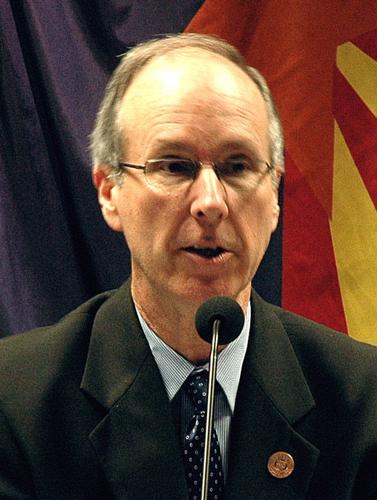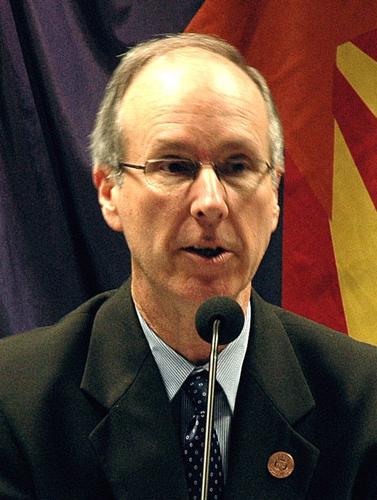PHOENIX — State lawmakers are moving to block the ability of Arizona voters to pass their own laws requiring background checks any time a gun is sold.
The legislation given preliminary House approval Thursday would have Arizona enter into an agreement with other states, with each prohibited from enacting any new regulations on the transfer of firearms beyond what already is in federal law.
And once Arizona has entered into such a compact, it could withdraw only once every decade.
Rep. Bob Thorpe, R-Flagstaff, admitted HB 2524 is aimed at trying to short-circuit efforts by former New York Mayor Michael Bloomberg to get individual states to do what Congress will not: Close loopholes in federal law that allow the sale of some guns without the need for the buyer to pass a background check.
And Thorpe said he was undisturbed that the compact would overrule the right of Arizona voters, as listed in the state constitution, to propose their own laws when the Legislature refuses to act.
Federal law requires licensed firearms dealers to do a background check before selling a weapon.
That, however, does not apply to person-to-person sales. And that exception has been interpreted to include individuals who are not licensed dealers who sell multiple weapons at gun shows.
Bloomberg has been using his personal fortune to change laws on a state-by-state basis.
A measure is already set for the November ballot in Nevada that would require an unlicensed person who wants to sell a weapon to do so through a licensed gun dealer who would be required to run a background check. The initiative would let the dealer charge a “reasonable fee” for the service.
It does have some exemptions, such as transactions between immediate family members.
Nevadans for Background Checks is getting financial support from Everytown for Gun Safety, a national group that is getting $50 million from Bloomberg.
Thorpe wants to quash a similar effort in Arizona before it starts. And he said it’s irrelevant if voters, exercising their right to create their own constitutional provisions and state statutes, vote otherwise.
The key, he said, is that the Second Amendment should trump all of that.
“That’s the baseline that we’re establishing,” Thorpe said. “We don’t want to degrade the rights that are already guaranteed at the federal level.”
He conceded, though, there is nothing in the Second Amendment that precludes background checks.
The idea of the Legislature approving something to override the right of initiative annoyed Rep. Stefanie Mach, D-Tucson.
“I do think it actually undermines the ability of Arizona voters to have their piece in policymaking,” she said.
“We, as a Legislature, in some regards have been more extreme than the population at large, which is why we, in our infinite wisdom, when we created the state, created an ability for the people of this state to directly have influence over policy,” Mach continued. “That initiative process is for when we don’t feel that the Legislature reflects our views or our values.”
Rep. Randall Friese, D-Tucson, said the problem with the compact is even deeper than that. He said it essentially has Arizona surrender its right as a sovereign state to make its own decisions in favor of what other member states agree.
Thorpe made it clear that he fears that Arizona voters might actually approve a measure to require background checks before any weapon is sold or transferred. But he said that does not make it right.
“It’s problematic, it’s troublesome, that a person with lots of cash in their pockets could come into Arizona, put a referendum on the ballot and have the money to really market that referendum to the point where it might be passed, where folks who are not paying a great deal of attention might help pass it,” he said.
Thorpe said there is a remedy for voters if they disagree with the decision of the Legislature to enter the compact: Vote lawmakers out of office.
But it’s not that simple.
Once in, member states can withdraw or propose amendments to the compact only every 10 years or on written, unanimous consent of all the other states.
There also is the option of pulling out if the Legislature calls a special session specifically to withdraw, but only after giving written notice of that session to every state in the compact at least 30 days ahead.
Thorpe’s measure now needs a roll-call vote of the House before going to the Senate.
The issue of Arizona’s gun laws — and the exceptions to background checks — became an issue in December in the wake of the killing of 14 people in San Bernardino, California, that the FBI described as a terrorist attack.
California Gov. Jerry Brown said that lax laws in Arizona and Nevada are creating “a gigantic back door through which any terrorist can walk,” although there was never any evidence that any of the weapons used there were purchased in either state.
Brown’s comment drew a harsh response from Arizona Gov. Doug Ducey.







